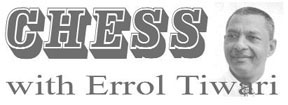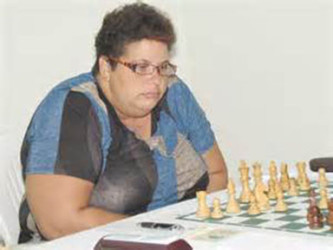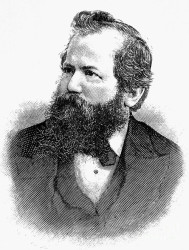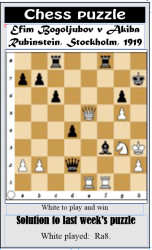Attorney-at-Law James Bond learnt to play chess last December. He was wowed and inspired by the game. Now eight months later, he felt inclined to stoke the smouldering remains of a chess fire caused by inactivity and sponsor a chess competition, minus the seriousness, over the past weekend. Undoubtedly, Bond wants to have chess re-energized for public consumption. His chess lobbying arrived at a time when players had seemingly re-directed their interest from the game. Now the fire is catching again, and the spring in chess players’ steps is returning.
 The reduction of regular chess competition has wounded local chess. The wounds are not serious, however, and can be healed with dedicated efforts. Chess will not survive if we do not play tournaments. The million dollar question therefore is: Do we want chess, the game of kings, to survive locally? The regular hosting of chess competitions has enlivened the game in countries and continents such as Cuba, North America, the Eastern Europe, India, China, and Africa to name a few which have benefited from the game in terms of respect, influence, education and money.
The reduction of regular chess competition has wounded local chess. The wounds are not serious, however, and can be healed with dedicated efforts. Chess will not survive if we do not play tournaments. The million dollar question therefore is: Do we want chess, the game of kings, to survive locally? The regular hosting of chess competitions has enlivened the game in countries and continents such as Cuba, North America, the Eastern Europe, India, China, and Africa to name a few which have benefited from the game in terms of respect, influence, education and money.
The game became interesting during the 1870s when a young, bright fellow from Prague, Wilhelm Steinitz , displayed nerve and will, and demonstrated sufficient talent to credibly label himself world chess champion. Before Steinitz, chess had been mostly a romantic game where the swashbuckling ideal was to sacrifice a boxful of chess pieces to chase the opponent’s king around the chess board, finally checkmating him so beautifully that centuries hence, students would marvel at a winner’s derring-do. Lovely as it was, Steinitz turned that notion on its head, accepting his proffered pieces and living to tell the tale through calm, rational defence. He wasn’t everyone’s favourite player, but he got things done.

Chess has matured from the time of Steinitz. The only way to compete successfully within the chess arena, is to chase down higher ratings which would in turn lead to stronger individual performances and secure an improvement in our country’s FIDE rank. A player gains or loses rating points in each game depending on the rating of his opponent and whether he has won, drawn or lost. The more rating points you get, the tougher they are to gain and to keep. That is why the player with the higher rating points is superior to an opponent with a lesser one. Magnus Carlsen is rated some sixty rating points above the number two chess player. That is why he is world champion. Regular chess tournaments would kick-start such a process.

It seems as if the James Bond tournament has given impetus to a renewed pattern of official championships. Beginning on Saturday August 22, from 100 pm at the Carifesta Sports Complex on Carifesta Avenue, a seven round swiss system tournament for the Forbes Burnham Memorial Trophy will commence. The tournament will carry a time schedule of one hour and a half per player per game. It shall be used as the National qualifier for the Junior National Championship. It is imperative, therefore, that juniors 20 years and under , desirous of competing in the National Championship, should participate in the tournament . Both junior and senior chess players are invited to participate. One round will be played on Saturday and two on Sunday.
Bond’s tournament has fanned the sponsorship flames into a blaze. The Burnham Memorial promises some attractive prizes, in keeping with the memory of the man. Although we played chess in days gone by for the greater glory of Guyana, Burnham matched respectability for country, with  prizes like books, chess clocks, chess sets, specially crafted trophies, Guyana holidays and cash. When he was here with us, everyone acknowledged that chess was Burnham’s game. Now it up to the PNCR, which is sponsoring next weekend’s tournament under the auspices of the Guyana Chess Federation, to make a deafening statement, a roar, on behalf of the man who loved chess dearly. Tournaments in Burnham’s day were hot commodities, because as we are aware, innovative prizes and money talk . A number of players say they are optimistic those early days would return.
prizes like books, chess clocks, chess sets, specially crafted trophies, Guyana holidays and cash. When he was here with us, everyone acknowledged that chess was Burnham’s game. Now it up to the PNCR, which is sponsoring next weekend’s tournament under the auspices of the Guyana Chess Federation, to make a deafening statement, a roar, on behalf of the man who loved chess dearly. Tournaments in Burnham’s day were hot commodities, because as we are aware, innovative prizes and money talk . A number of players say they are optimistic those early days would return.
The James Bond tournament was modest in terms of numbers, but the renewal took place with verve. It was a light competition. Wendell Meusa won the seniors category. He was ruthlessly efficient with the manner in which he manoeuvred his pieces although, having been inactive since December.
Chess games
The following games were played at the Russian Superfinals, in Chita , Russia . The tournament is ongoing and it concludes on August 21 .
White: Vladislav Artemiev
Black: Alexander Motylev
1. d4 d5 2. c4 dxc4 3. e3 e5 4. Bxc4 exd4 5. exd4 Bd6 6. Nf3 Nf6 7. O-O O-O 8. h3 Nc6 9. Nc3 Bf5 10. Bg5 h6 11. Bh4 g5 12. Nxg5 hxg5 13. Bxg5 Re8 14. Qd2 Nxd4 15. Rad1 c5 16. b4 b6 17. bxc5 bxc5 18. Rfe1 Rxe1+ 19. Qxe1 Be6 20. Bxe6 fxe6 21. Rxd4 Bh2+ 22. Kxh2 Qxd4 23. Qxe6+ Kg7 24. Ne2 1-0.
White: Evgeny Tomashevsky
Black: Igor Lysyj
1. c4 Nf6 2. Nc3 e6 3. Nf3 d5 4. d4 c5 5. cxd5 Nxd5 6. e4 Nxc3 7. bxc3 cxd4 8. cxd4 Bb4+ 9. Bd2 Bxd2+ 10. Qxd2 O-O 11. Bc4 Nc6 12. O-O b6 13. Rad1 Na5 14. Bd3 Bb7 15. h4 Rc8 16. h5 h6 17. Rfe1 Qe7 18. d5 Nc4 19. Bxc4 Rxc4 20. Ne5 Rc5 21. d6 Qd8 22. Qf4 f6 23. Ng6 Rf7 24. e5 fxe5 25. Ne7+ Kf8 26. Ng6+ Kg8 27. Ne7+ Kf8 28. Qg4 Bd5 29. Nxd5 exd5 30. Rxe5 Qxd6 31. Rde1 Rf6 32. Re8+ Kf7 33. Qa4 Rc7 34. Qb5 Qc6 35. Qe2 Qc5 36. g3 Rd7 37. Re6 Rd8 38. Rxf6+ gxf6 39. Qg4 Rg8 40. Qd7+ 1-0.
White: Vladislav Artemiev
Black: Alexander Motylev
1. d4 d5 2. c4 dxc4 3. e3 e5 4. Bxc4 exd4 5. exd4 Bd6 6. Nf3 Nf6 7. O-O O-O 8. h3 Nc6 9. Nc3 Bf5 10. Bg5 h6 11. Bh4 g5 12. Nxg5 hxg5 13. Bxg5 Re8 14. Qd2 Nxd4 15. Rad1 c5 16. b4 b6 17. bxc5 bxc5 18. Rfe1 Rxe1+ 19. Qxe1 Be6 20. Bxe6 fxe6 21. Rxd4 Bh2+ 22. Kxh2 Qxd4 23. Qxe6+ Kg7 24. Ne2 1-0.




